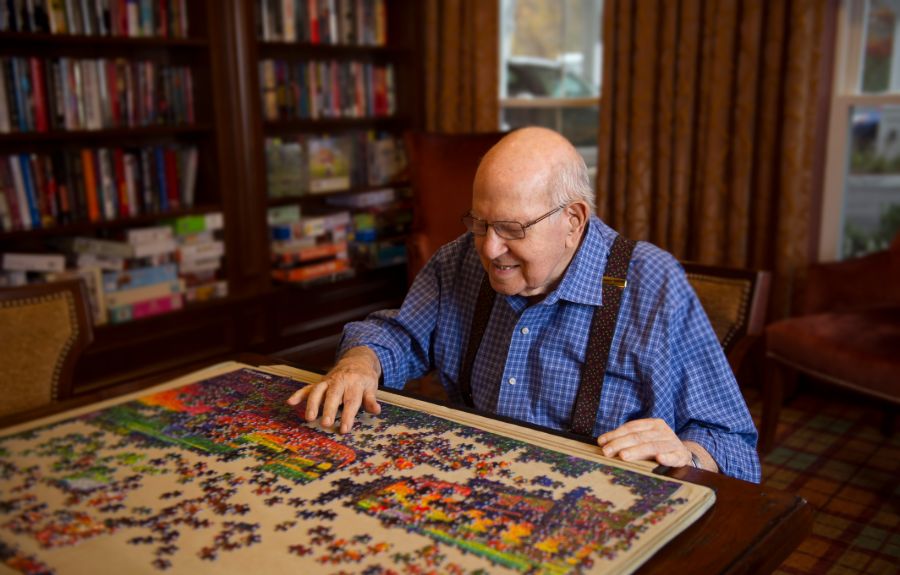Sometimes illnesses and ailments are obvious to nearly everyone but the people affected by them. Growing up, you may have thought you had a simple cold or allergy-induced wheezing only to later learn you had bronchitis or pneumonia. You may have run on a sore ankle only to later discover it was sprained or nearly broken, or maybe you attempted to push through the workday with dangerously high blood pressure because you figured your symptoms weren't hindering your work pace. Sometimes we optimistically overestimate our ability to perform daily tasks when our bodies are under duress — and the same is true for many seniors with Alzheimer's disease.
Reflect on Your Own Experiences
Think about how you felt when you discovered an ailment was more serious than you originally realized. Perhaps you felt frustrated, depressed, scared or angry. You might have even denied that your injury or illness existed, regardless of whether medical exams proved otherwise.
Remembering your feelings can help you empathize with your parent or another special senior in your life who's living with dementia. It's a difficult diagnosis for many older adults to accept, so keep that in mind if your loved one becomes defensive when you broach the topic.
Approach the Subject Gently
Family members often become upset or discouraged by a loved one's limitations. This may result in hurtful remarks like, "Mom, I've already told you that a million times," or "Dad, you left the oven on again, so why don't you just let us cook?"
Comments like this don't help the situation, even if you have good intentions. It's important to approach the topic gently and let older adults know you're there to help if needed. Don't always wait for them to ask, though. Sometimes it's best to take the lead and kindly say, "Hey Mom, let me help you into the passenger seat. I'll drive us to your doctor's appointment today."
Practice Patience and Compassion
Your loved one didn't ask for ailments or Alzheimer's disease. The memory-impairing condition affects nearly 6 million seniors as well as the 16 million Americans who help provide care for them. While some lifestyle choices may increase the risk of developing Alzheimer's disease, there are no proven prevention strategies.
So be calm and compassionate, and don't blame your loved one for their condition. Avoid rolling your eyes as they retell the same story, and don't engage in unnecessary arguments about their actions. It can be stressful to take on a caretaker role or talk to your loved one about assisted living options for memory care, but try to get through each day with kindness and mercy.
Validate Their Feelings
Listen to your loved one when they mention they're scared, tired or angry because Alzheimer's disease does take a toll on older adults both physically and mentally. Avoid making dismissive comments, such as, "It's not that bad," when special people in your life talk about their struggles, and gently debunk inaccurate accusations by asking questions about the situation.
For example, if your loved one accuses you of hiding their scrapbook that they misplaced, you can say, "Those memories are special, aren't they? Let me help you find it." Don't defend yourself in a war of words; gently redirect the conversation in an appropriate manner.
Your loved one is an important part of the world even while they're disoriented or hostile. Help preserve their dignity by treating them respectfully through every stage of Alzheimer's.
Explore Positive Solutions
Aging at home is not always a pleasant experience, but your loved one may be hesitant to leave — and understandably so. After all, home is familiar, and it may help preserve memories in older adults who are losing their past experiences to dementia. They may also fear they'll be left alone in an assisted living community, though the reality is that many residents thrive in a community setting and children remain in contact with parents who move into a communities.
A senior living community, such as Brightview Senior Living, offers socialization opportunities, respectful dementia care, quality food, security, compassion, fun recreational activities for residents, and trained associates. Brightview associates are friendly and knowledgeable, and state-approved guidelines help residents thrive in a safe and secure setting. You can visit regularly, enjoy family dinners, and residents can call home as often as they like.
Aging brings many challenges, especially for seniors with Alzheimer's disease. However, older adults can still live happy, fulfilling lives with this condition. Talk to your loved one about their concerns, and let them know vibrant assisted living can help seniors with dementia make the most of each day.


